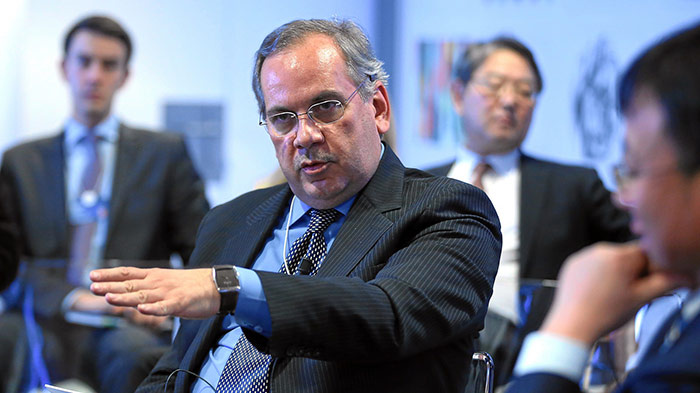Why Iran Is Not, and Has to Become, a Regional Power.

Why is Iran such an easy target? Why is it almost free to make accusations against our country? Why should the speaker of the Foreign Ministry dedicate most of his time to denial of allegations or explanation of the country’s foreign policy? Why do many actors, from Djibouti to neighbors and world powers, ignore us? Why did almost every member of the Organization of the Islamic Conference vote against Iran?
From an international relations perspective, the answer to these questions is crystal clear. There are facts to take note of before answering the question however: over the past 40 years, Saudi Arabia has turned into a significant energy actor, both inside OPEC and beyond the organization, with investments and partnerships across the globe. Here are some facts:
- Ten million foreign laborers work in the country with an income worth almost $18b. About 44 thousand Arabs and non-Arabs receive salaries that total $5b from the Saudi government for work in the country’s healthcare, industry, and education sector.
- Europe acted more moderately compared with the US in imposing sanctions on Russia over the annexation of Crimea, because EU trade volume with Russia approximates half a trillion dollars. US trade with Russia is only $40b, which is meager in international scale, making it quite easy and cost-free for Washington to impose sanctions on Russia.
- The US treats China cautiously because it has half a trillion dollars in trade with the country. The Chinese are acting so secretly and complicatedly that the West has no accurate intelligence regarding its financial and military power and has to rely on speculations.
- The US will eventually have to compromise with Mexico because agricultural and services sectors in the US will be impaired without Mexican workforce.
- The Europeans tolerate each other because 70 percent of their trade takes place inside the European Union. Everyone respects Germany because its trade surplus in 2016 ranked first in the world with $285b.
- Only in Africa, half a million Chinese engineers are working in production and construction sectors.
- A third-class Indian passenger airline has recently ordered 205 Airbus jetliners.
- Annually, about 170 million foreigners visit the US from 535 entries. Nine hundred Muslim police officers work in New York City’s police department.
- Five million Britons have villas in Spain.
- Every year, nearly 13 million foreigners travel to Dubai.
- Six million Indians work in the Arab states of the Persian Gulf.
And thousands of other figures on reciprocal transactions and ties among countries.
Compare these facts with the excited, jubilant faces of Iranian executives inside the aisle of the recently delivered Airbus to Iran. The truth is that Iran is merely an importer. The Europeans’ support of the nuclear deal is because they can sell their products and services to Iran. The US needs not Iran, but Saudi Arabia, Turkey, and Egypt. A major part of the respect a country pays to others comes from necessity, not ethics. International relations are defined in terms of need, fear, and thus respect.
Back to our first question, why can other countries adopt cost-free stances or allegations against Iran? There are people who cannot even tell where Iran is located on the planet, but feel free to make whatever accusations against Iran, since Iran has holds no significance for them. What country, industry, or firm needs us? What country is afraid of us? That is the principle of indispensability.
To create a balance in their relations with their Chinese neighbor, the Indians have established deep and extensive collaborations in construction and services with Japan. Saudi Arabia has invested $20b in Russia to regulate Moscow’s policies. When a country makes another country dependent, especially a neighbor, it will naturally prevent aggressive behavior and rhetoric. Our oil, gas, and petrochemical products have available rivals in the international market. Iran’s agricultural products have foreign similars while Indian, Turkish and Chinese carpets have satisfied the average customers.
So what is our strategy to make at least a few countries need us? Our diplomatic apparatus has had no foreign policy strategy in the practical sense of the word, because its views strategy synonymous with visits, meetings, and talks, declaration of positions, denial of accusations, and self-defense, sermons and calls for toleration and adherence to moral principles. What economic, technical, or political foundations have theorized our foreign relations? Could the country be administered without regional and international strategies? Is domestic management possible in the absence of an international strategy?
In the present global system, no country respects another for free. Britain agrees and endorses deep banking and financial ties with China in the face of US opposition. By turning into the most significant player in Syria, Russia hopes to force US into a compromise regarding Crimea, Ukraine, East Europe, US missiles deployed in northeast Europe and economic sanctions.
International relations resemble a spider web. When merely based on legal recommendations, foreign policy and national strategies cannot generate positive results. Not only we have made ourselves unneeded by others, but also we sometimes violate their red lines. And the result is quite clear.
If Iran aims to turn into a regional power, Iranians should prove their capabilities and potentials. Iran should actively engage in regional and international circles of power, wealth, industry, and culture. We are no less than India or South Korea. However, the realization of such ideals requires a strategy: power, security, and glory of a nation could be guaranteed through establishing reciprocal relations and making others need you.
* This piece was originally published in Mahmood Sariolghalam’s personal website. Mahmood Sariolghalam is professor of international relations at the School of Economics and Political Science in Shahid Beheshti University.

